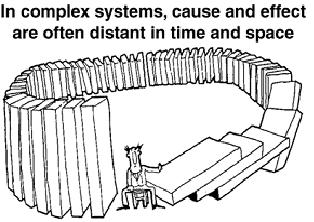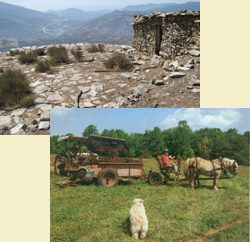« The Interdependence of Phantom Financial Wealth, Phantom Carrying Capacity and Phantom Democratic Power | Home | Three Farmhouses: A Study in Passive Solar Design »
Food Production Systems in the Decline of the Industrial Age: A Call for a Socio-ecological Synthesis
By Karl North | June 9, 2013
The sustainability of industrial food production has long been under attack for its destruction of the soil, water, air and other products and services essential to life on earth. Now the massive consumption of energy and other resources needed to build and maintain industrial society has led to the depletion of these materials to a degree that makes the survival of industrial agriculture even more implausible due to its utter dependence on external inputs. The population that will come through the gauntlet of industrial decline will depend on the level of agricultural productivity that can be sustained. The thesis of this paper is that human society is entering a new era in which agricultural productivity and subsequent carrying capacity in human population will depend on major changes in three areas:
- A society reoriented to emphasize agrarian communities more than urban living environments;
- Agroecosystems designed to rely on local self-sufficiency and biological diversity rather than high external inputs, and
- A scientific paradigm that re-emphasizes whole system modeling rather than exclusively reductive methods, specifically one that develops a synthesis of sociological and bio-physical research.
It is important to recognize that the effort to implement these changes will confront deeply imbedded socio-cultural patterns that are an unfortunate legacy of the industrial age.
The Urban/Agrarian Conundrum
A highly urbanized global population reliant on cheap but energy-intensive food production is one of the extravagant legacies of the waning industrial age. As industrial economies go into permanent decline, they will gradually fail to support large populations used to an urban standard of material consumption. Moreover, even where agricultural science is moving in the direction outlined above, a highly urbanized society is an impediment to change because too few are able or willing to become farmers.
Cuba is an interesting example of the problem. Cuba is a world leader in the design of low input agroecosystems. But Cuba, like most highly urbanized societies, has a farming population that is too small to produce enough food to feed its whole population using these labor–intensive systems. Incentives to encourage urbanites to move to rural communities and adopt an agrarian life have not had the necessary success. Therein lies a good part of Cuba’s failure to achieve food sovereignty after a half century of revolutionary programs devoted to that goal.
Like Cuba, most nations are hamstrung with urban populations inherited from the industrial age. Does this mean that the geographic reconfiguration of society that is necessary must await the chaos and suffering that will accompany the deterioration of city life in the post-petroleum era? Once again in history, perhaps only necessity will drive change. See my Cities and Suburbs in the Energy Descent: Thinking in Scenarios for more exploration of this question.
Diversified, Self-sufficient Farming Systems
The lack of farmers is only one of the negative legacies of the industrial age. Another is an economic system that favors agricultural specialization to such a degree that it has structured even the quest for more sustainable alternatives. Some farmers in the organic farming movement have understood the ecological efficiency and resilience of highly diversified systems that will be essential in the energy descent. But generally they have found it hard to create them because these systems are not yet economically competitive in the present economy. In my Visioning County Food Production, Part Two: General Problem areas in Sustainable Agriculture Design I presented historical models and agroecological theory that support the integration of crop and livestock production as central to the improvement of agroecosystem sustainability, but successful integration is still rare in the alternative agriculture movement in the US. Part of the problem is the management skill and effort that such complex agroecosystems require, but one solution, at least in the present economic environment, may be sociological. Rather than design the farming system around the nuclear family, it may be easier to achieve the necessary diversity by designing it around an agrarian community of close neighbors that can cooperate to provide the diverse elements that a system requires to gain sustainability.
Whole systems Perspective
A third unfortunate legacy is a scientific paradigm that prefers the predictability of knowledge that comes from narrowly focused research. Born in the 17th century Enlightenment and championed as a close fit to the needs of the nascent capitalist political economy, this paradigm has bequeathed a highly compartmentalized knowledge business that lacks complex system theory and modeling methods in many fields. In our systemically structured world all applied science requires systems thinking and modeling tools. This is especially true in agricultural science, where increases in sustainability are achieved mainly by designing integrated wholes, not by simply accumulating a grab bag of “ecological practices”, as Wes Jackson described most of the work of academics who claim to be doing agroecology. Moreover, in a world increasingly depleted of the external inputs on which agriculture, including most organic farming, presently relies, the new farming systems must be highly self-sufficient in inputs. For decades, agronomists have paid lip service to the study of natural systems that excel in input self-sufficiency. Temporizing on this issue must give way to action.
As many have argued, natural selection in several billion years of natural history has evolved far more sustainable ecosystems than humans have invented in a few thousand years of agriculture. Logically therefore, the core of training in agricultural science should be systems ecology and complex systems theory, which cannot be absorbed incidentally through the curriculum of separate courses in plant science, soil science, animal science, etc. that are the typical program in most agricultural schools.
In some fields a whole systems approach is already prevalent. Biophysical economics, climate science, public health, dialectical political economy, and systems ecology itself are examples that can provide direction to other fields of ways to model problems in their appropriate historical and systemic context. In agricultural science, not only cultural inertia and its vested interests in academia, but powerful interests in the agricultural economy as well have created headwinds to inhibit change. I explore these questions in more detail in Reductionist science and the Rise of Capitalism: Implications for a New Educational Program of Agricultural Science.
Here again, a science establishment that can survive the decline of the industrial age will require radical changes not only in the content of the science, but in the social configuration of institutions of knowledge production as well. Transdisciplinary research will need to become the norm. Valuable farmer experience derived from daily confrontation with whole systems will need to gain a more important role in the advancement of agricultural science.
Conclusion
Brief exploration of each of three major problem areas in food production has hopefully revealed that change in each requires that sociological understanding go hand in hand with ecological knowledge. Also, by describing these three problem areas together in one essay, I hope to have made clear that, because of their interdependency, none of them can be addressed adequately in isolation. A long history of such isolated problem solving in science has produced a string of technologies that seemed spectacular at the outset. But because of their more distant consequences in time and space, these technologies taken as a whole bear considerable responsibility for the desperate state of the planet today.
Topics: Agriculture, Northland Sheep Dairy, Social Futures, Peak Oil, Relocalization, Systems Thinking Tools | 2 Comments »


June 12th, 2013 at 9:47 pm
Thanks for your analysis Karl. I think we are seeing the early signs of a coming wave of flight from urban areas towards agrarian alternatives. Each year Groundswell has been attracting more aspiring farmers from NYC, folks who see which way the wind is blowing and are heading into the country, ahead of the curve. Our task is to ensure that people of all backgrounds, races and economic means have the opportunity to do so.
June 12th, 2013 at 11:19 pm
Many of the undergraduates from urban backgrounds in my classes saw the need to change, but few were ready yet to take the plunge. Hopefully projects like Groundswell will help more people get through the gauntlet.